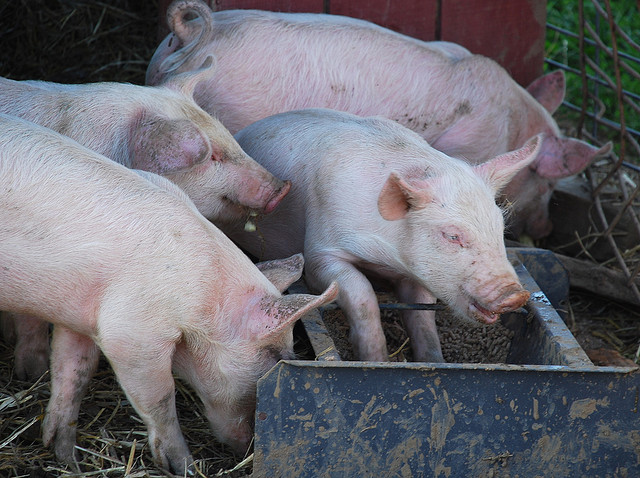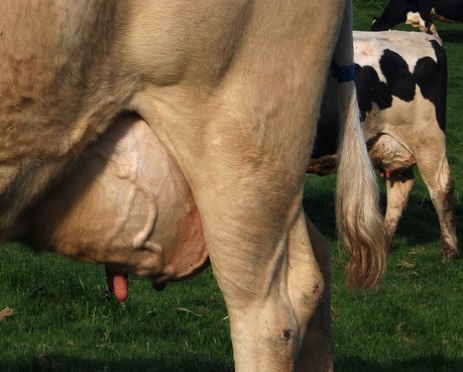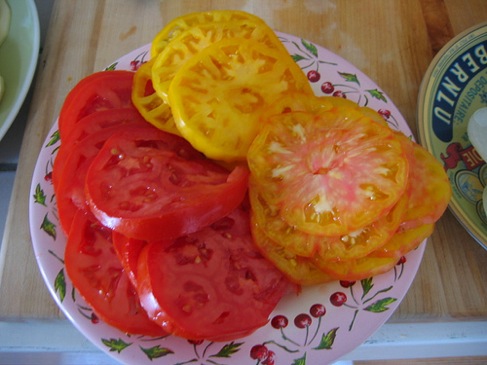When most of us think of high-tech companies, we tend to think of the outfits that make software we can use on our phones: Google, Facebook, Microsoft, Twitter, Uber, and all the rest. But the computerization trends of the past decades have affected agriculture and industry just as much as anyone else, and now famous farming company John Deere is planting its flag in the heart of Silicon Valley. [More]
agriculture

$130B DuPont, Dow Merger Approved After Companies Sell Off Some Products
The two oldest, biggest chemical companies in the country can now live happily ever after together (minus a few products), as federal antitrust regulators have given the green light to this $130 billion mega-merger. [More]

You Cannot Grow Bananas In Ohio
Bananas thrive in a subtropical climate: a place where the temperature is warm, the humidity is high, and there’s about twelve hours of sunlight per day. You know, like Ohio. [More]

Porcine Epidemic Diarrhea Won’t Make You Sick, Might Make Pork More Expensive
“Porcine Epidemic Diarrhea” sounds incredibly unpleasant. The disease first showed up in the United States last year, and thanks to the cold weather nationwide has showed up in 27 states. What is it, and should humans be worried? Not unless you own any hogs or you have a tight budget for meat for the next year or two. [More]

Former Tobacco Fields Now Grow Chickpeas To Serve America’s Growing Hummus Addiction
Fewer Americans smoke today, which is a really good thing for our collective health and finances as a nation. It’s not so good for farmers in the areas of Virginia and the Carolinas that once were tobacco country. However, it just so happens that there’s a new addiction sweeping the nation that those farmers can profit from. Americans just can’t stop gobbling hummus. [More]

1,600 Turtles Break Out Of Farm, Slowly Crawl To Freedom
It’s like a real-life version of the movie “Chicken Run,” only without Mel Gibson and much, much slower. Near Summerville, Georgia, there is a turtle farm. Thousands of adult turtles, all native species to the southern United States, live in ponds on the property. Thanks to vandals or scrap metal thieves, breaks in the fence have allowed the turtles to wander off the property, taking up residence in surrounding waterways. The operation is something like a hatchery, and about 1,600 of the 2,200 turtles that form its breeding stock have run away. [More]

It's Cheaper For Farmers To Let Strawberries Rot Than Sell Them Now
In Florida, acres of delicious strawberries are starting to ripen, and… being left to rot and plowed under. Thanks to cold weather at just the right point of the winter growing season, berry crops are so bountiful that it’s more cost-efficient to let the berries rot than it is to pay anyone to pick them. [More]

Child Labor? In MY Local Store? It's More Likely Than You Think
Was anything you own made with forced or child labor? It’s more likely than you think. Last week, the U.S. Department of Labor finally released a long-awaited report on the use of child labor or forced labor worldwide. The unsurprising result: Children and forced laborers work in agriculture, mining, and manufacturing worldwide.

Another Month, Another Beef Recall
The summer of beef recalls continues, with the creatively named Beef Packers recalling 826,000 pounds of ground beef linked to salmonella illnesses in the western U.S.

Country Of Origin Labeling Officially Begins Today
The long-awaited country of origin labeling or COOL will be enforced beginning today — so you can expect to see a “COOL” on “muscle cuts and ground beef (including veal), pork, lamb, goat and chicken; wild and farm-raised fish and shellfish; fresh and frozen fruits and vegetables; peanuts, pecans, macadamia nuts and ginseng.”

Obama Administration Asks Meat Industry To 'Voluntarily' Follow Stricter Labeling Guidelines
Earlier this week, U.S Agriculture Secretary Tom Vilsack told consumer groups that “he will ask the meat industry to voluntarily follow stricter guidelines for new package labels designed to specify a food’s country of origin.” If they don’t comply, “the administration will write new rules.” The request won’t please meat packing companies, who often mix Mexican with U.S. beef before selling it.

Monsanto Is Trying To Ban Hormone Labeling At The State Level
Monsanto continues its attempts to hide the basic facts of food production from consumers, this time in Kansas. The Kansas Dairy Association, along with a suspicious “grassroots” dairy group that has the same public relations firm as Monsanto, has helped introduce a bill to the state Senate that would ban “growth hormone-free” milk labels. The bill’s supporters argue that growth hormone can’t be found in lab tests, and if a lab can’t verify it, consumers don’t need to be told about it.

Vegetables Were Healthier Fifty Years Ago
The heirloom tomatoes in your garden may not just be tastier than commercially grown vegetables, but healthier too, according to a study from the American College of Nutrition. The study looked for 13 nutrients in 43 crops grown from 1950 to 1999 and discovered that the vegetables enjoyed by our grandparents were significantly more nutritious than the veggies found on supermarket shelves today.
After rigorous statistical analysis, the researchers found that, on average, all three minerals evaluated have declined; two of five vitamins have declined; and protein content has dropped by 6 percent.
Taco Bell e. Coli outbreak Catches the Eye of Congress
- In Congress, Rep. Rosa DeLauro, D-Conn., who will chair the agriculture subcommittee of the House Appropriations Committee, intends to hold her first hearing on food-safety issues. She hopes to haul in Taco Bell executives, along with other industry figures.

Department of Agriculture Fails To Quarantine Genetically Modified Crops
There’s a compelling argument that genetically modified crops is the only way to adequately feed a world population of which a large percentage is starving. For people in some countries, the creation of a drought or locust resistant crop might be the only thing standing between farmers and financial ruin or starvation. Luckily, in America, this isn’t a problem most people have to face. Consequently, the sales and production of organic foods is on the rise as many consumers avoid what they feel to be unnatural, which is a totally valid and important choice for a responsible consumer in a first-world country to make… especially given the controversy surrounding G.E. foods.




